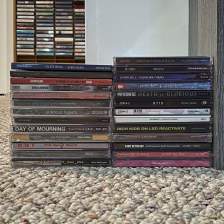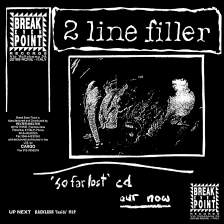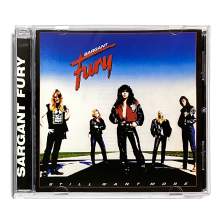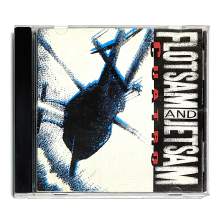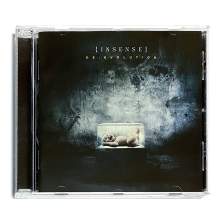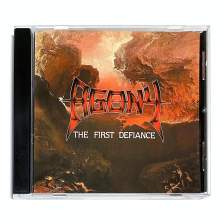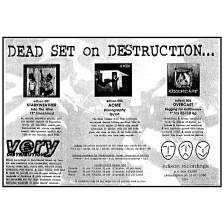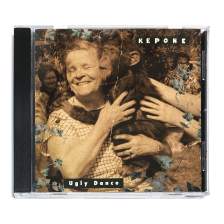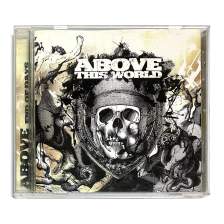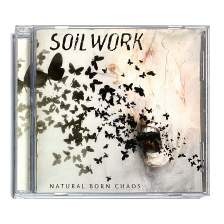I've been a huge fan of Thine since the early-2000s. As mentioned in my recent review, their superb new album, The Dead City Blueprint (out now via Peaceville), was one of the most anticipated releases of the last decade for me. So, I took the opportunity to chat with the band's guitarist, Paul Groundwell, about Thine's continual evolution, their underappreciated status... and even a bit of '80s pop music!
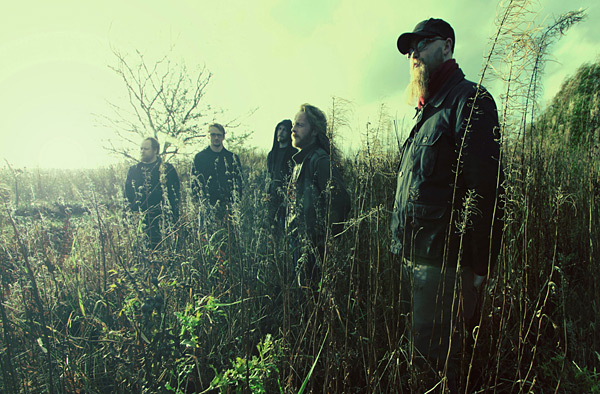
I know Thine remained active to varying degrees over the span of about 12 years since In Therapy. What was the catalyst that finally brought everything back into place to make The Dead City Blueprint a reality?
It had been stirring for a while, really... probably from around 2008 when Dan rejoined and we quickly recorded some songs I had over a couple of days at his place, to see how it was shaping up generally. Then it was the end of 2010 or '11 when we recorded three tracks in a studio setting, which included "Brave Young Assassin" and "Take the Risk." We were impressed with how they turned out, so we kept heading towards this goal of the "comeback" album. There were lots of songs in place which were all gradually replaced with more current pieces during a productive and dark time personally in 2012. Then, yes, the stars aligned and we were ready for Chapter 3 of the saga. I think we all knew it would happen—we just didn't know when, or in which lifetime, heh.
In what ways did the decade-plus gap impact the band's overall vision for your continual evolution in approach?
More maturity and experience as individuals, but in some ways the songs on this album aren't so different from those made around 2002/2003 onwards—which had some experimental qualities for sure, and were a bit more atmosphere-focused than In Therapy. Possibly an extension of "Bleaker Audio" from that album, now that I think of it. They were also a bit more sampled-sounding and electronic on occasion in their rough demo state. Not the feeling we were after, but it was more a result of the programs I was using at the time to construct the tracks. So, yes, overall it is just 10+ years of experience shaping the story towards where we exist at this point.
Also, track one on the album is from 2003 originally (though admittedly it has been reworked), so it hopefully shows we retained an element of consistency, as it doesn't stick out from the other songs. Just one constant progression.
You've remarked in other interviews that writing In Therapy Part II would have been "pointless." Having no interest in repeating the past is not an uncommon motivator for musicians, but since that album was fairly well-received, I'd like to play devil's advocate and ask for some specific insight behind that reasoning. For example, some signs indicate that the initial writing process for The Dead City Blueprint was not terribly far removed from the style of its predecessor. Did you recognize and then consciously break away from those leanings, etc.?
I think some of it is part of the natural evolution, but much of it is just doing what we like without existing with barriers. In many instances, the new album tracks actually sound closer to In Therapy than some of the songs written over 10 years ago—an example being one called "Watermills," which had a modern, sampled style with a piano loop, and was a bit like Massive Attack or something (okay, maybe not, but you get the idea). Alongside those kinds of songs were many In Therapy-type rock tracks. But that style should not define us. I mean, those types of songs have not fully dropped from our radar, because even in 2012 there were songs written which could easily sit on In Therapy. I wouldn't say it was a conscious decision to break away from that style; it just happened by way of wanting to explore other things as a writer while keeping the essence of Thine intact—but this has always been the case with us anyway. Personally, I'm more into conveying emotion than rocking, and always have been. These recent times are more a quest towards seeking a state of peace with the self and the world and the acceptance of finality, and so rock tracks aren't reflecting that mood currently.
Also, I think a few people commented (about In Therapy) that many of the songs sounded similar, and so we felt that we needed to show a bit more of a dynamic overall, which I think we achieved on this one.
Something that's become more and more apparent about Thine's work over the years—and especially with the ambitious attention to detail heard on the new album—is the way that some of the songs take some time to really sink in and "click." It's entirely possible that this phenomenon rests solely with the individual listener and their own perceptions of the material, but is there anything about that characteristic of the compositions that's intentional?
We have heard this from a few people, but it wasn't really the intention. Sure it has plenty of layering and some twists, but I still thought it would have a good level of initial accessibility, as it's hardly complex structurally. Ultimately it is no bad thing, as it's an album which grows with repeated listens with some deep messages, so it endures. I think this has become apparent in a few reviews, too, in that you can tell who has invested a part of themselves and their time in digesting and dissecting the album. Some are superficial listeners you could say, which is understandable with the amount of music out there. Time is precious, but aside from that, if Thine is not for them and does not resonate profoundly on any level with them, then c'est la vie!
It is quite telling, though, that some have said that only after reviewing it (under understandable time constraints for printed press), that the album had grown on them more and they "got" it, so I do wonder how many cases of that there could be, and how different some reviews could be if revisited now. Thankfully the reviews were good anyway, though.
"Timeless" is how some people have also described the release, which we very much like and appreciate.
It's probably safe to refer to The Dead City Blueprint as Thine's most "progressive" album to date, but it's interesting that your debut, A Town Like This, presented "prog rock" influences in a somewhat more tangible—albeit cruder—form. Do you see any parallels there? Is this a more mature take on the same underlying influences, or something more altogether?
We had said between us in recent years that this album seemed to be heading in the direction of A Town Like This mixed with In Therapy. Seems a fair estimation, but much of the metal "riff" style has gone, as has the almost schizophrenic nature of composition from that first album, and any gothic hints. So there is structure and flow, and still relatively complex multi-layering going on. But even with this album, there wasn't an intention for it to be prog rock either. It's all just music written from the heart, from some dark corners, too. But at this point in time the songs are written from the perspective of what a Thine song would sound like, not what it would sound like using influences from whoever else. It's a good place to be.
On the first album we had comparisons to King Crimson, Gong, and the early Genesis era—which we never listened to any of back then. On the first album I'd say it was more disorganized structuring created in sections—and experimental riffing with some youthful hunger—than consciously creating prog music, but I don't know where they cross over anyway. They're probably often just the same thing from different perspectives; but our insular, youthful world was a mirror instead of a window, so all we saw was ourselves.
To me, the lyrics are starting to feel almost "poetic," in a sense. Increasingly artful and open for interpretation, but not vague enough to be devoid of meaning or suggestion. Would you say this is in part a reaction to the occasional bluntness of In Therapy?
I can see there was more of a "street level" bluntness to some of In Therapy, and it was a bit more angst-y, while this album is more detached and reflective, having been removed from a situation. So not of the moment, but more a deconstruction of events and attempting to make sense of everything—mortality, purpose, and observations of the self and others ("Bleaker Audio" from In Therapy could be seen as a natural precursor to this, though, I suppose). In Therapy felt more a study of one's potential volatility and reaction amongst society and tipping over the edge, whereas this one is more of isolation and introspection and solemnity. Certainly detachment, which is a sign of the times. Everyone looking at their projected lives through a virtual window. Connected yet alone.
The alternate answer to your question is that the lyrics are very carefully written so that they have lots of personal meaning on one level, but are ambiguous enough for nobody to be particularly offended, ha, ha... But you are right in the poetic reference, as there was an intention to make it more beautiful and elegant. Turning negatives into positives, and painting a grim chapter into one of vibrancy and resplendence to make it more liberating to exist with and reflect upon.
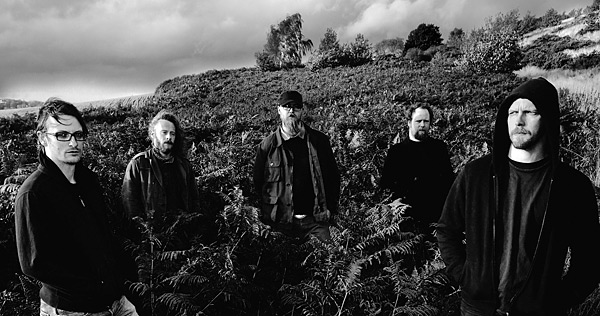
The new album's cover art is fantastic. Do you have any kind of background in visual arts? I can't imagine this was your first foray into that realm?
Nothing special, just a creative person with too much time on his hands, ha, ha—which means staying active musically, lyrically, and visually. It gets me by. I've made plenty of art, but nothing much of note for the wider world, and there's no real background to speak of beyond waaaay back in school. I just employ some imagination and conviction to shape a view, and that's what can come of it... and add a bit of turmoil from time to time.
Lots of symbolism and meaning in that cover—in a way representing how the album came to be in the first place, so it's not like a pointless design to look cool. I think there's a certain charming eloquence to the image overall, though. Apocalyptic eloquence.
Speaking of the layout and your aforementioned attention to detail, the morse code is such a great touch. It's rare these days to encounter an album that—even visually—requires a bit more from the listener. Apparently there was even an unused cover/booklet design, too, which makes the process seem that much more painstaking! Was being so deliberate stressful at all?
Yes, there was an unused cover and a whole booklet of pictures which weren't used either. The central theme was transmissions, and the images mostly based around a mast dominating the landscape—like a lone figure keeping silent watch, yet behind the scenes is at work emitting its signals. I was very drawn to this image and concept, for a time, to represent isolation contrasted with a means of connection. The morse coded message is in reaching out. We're all just strangers, detached, often unreachable, deteriorating fragments of consequence and coincidence... and then all the art was changed, ha, ha.
Stressful? It might only have been stressful for the others with me changing my mind so much, but at least the workload was self-inflicted, so I didn't have to burden anybody else to come up with the visuals. No real stress for me—though on the morse code it took me absolutely ages to translate it all into dots and dashes to go in the booklet, only to have Dylan tell me there's a program which converts it straight away, heh, heh. Oh well.
Considering all the time, talent, and effort required, is it irritating that the band remains relatively underappreciated? Or does that even matter? Does the respect of your peers and a core group of fans who "get" it—or the creative process itself—suffice?
Well, this is one of the eternal questions. I'll say we are for sure underappreciated. But what is the point of fulfillment? What is enough? At what point do you say, "Okay, I am happy, I am content. I need nothing more from anyone, and I have succeeded." The answer is "rarely ever," no matter how much we try, because we are here to spread our seeds so our traces live on—and the standards are forever shifting.
I'm personally happy enough that we've had the chance to make and release an album, never mind three (and well-received ones, too). But sometimes you look around and see a lot of "template" bands with nothing to say reaching certain levels of success, or ones riding the wave of a trend, and there is a slight sense of injustice—but then you realize that's life, and do not live by looking over your shoulder at everyone else. Tough to do when ego is never far away, but it's all about the journey and the validity of what we surmise by the end of it.
Great that fans and peers like it. And, personally, the cathartic process of creativity is enough, and I sometimes wonder that if we sold 50,000 albums then maybe we'd only wonder why we hadn't sold 100,000, and so on and on—this ever-shifting bar. Never enough.
Somebody said In Therapy helped save their life twice. Many others said it helped them through tough times. Real human scenarios. People injecting Thine into their lives and giving the songs profound meaning beyond what we can. I'd say that will suffice. Making a difference to somebody's well-being through art, than to another's bank account.
In one of the recent interviews I had read, you remarked that you're at times influenced by '80s music (including power ballads, no less). I'm a huge fan of that stuff, and personally always find it refreshing when musicians discuss what many would consider to be "unlikely" listening habits. Do you have any particular favorites in that realm, and/or are there any other forms of music you tend to draw inspiration from that might be deemed "atypical" of a metal-based band such as Thine?
The thing about Thine is that people sometimes seem to want to dictate our influences for us, ha, ha. "Oh, these guys have clearly been influenced by Katatonia, Anathema, Paradise Lost, Opeth..." Well, actually, in earlier years there was a bit of truth to some of that, heh, but not for a long time—not consciously anyway. We grew up in the '80s pop generation. Plus, I grew up listening to lots of older stuff like Motown, as my dad was always playing it. On "To the Precipice," from this album, I'd envisaged it should end like a Motown-style song. Didn't quite work out that way, but it was meant to fade out with the vocal layers doing some soulful bits over the top of the chorus.
The '80s had some great songs, though, to go with the bad fashion, heh. Tracks like "The Living Years" are hard to beat and cannot be done these days, I think. Phil Collins, Kate Bush, Spandau Ballet... "Drive" by The Cars. I mean, "Careless Whisper" is a great song, too. Lots of nostalgia involved, though, I understand. "The Final Countdown," "Eye of the Tiger," "I Want to Know What Love Is," "(I Just) Died in Your Arms," "Vienna," heh. Takes you back, and that's kind of the point. The warm comforts and magic of youth, which become a part of the fabric of who you are—or a reminder of who you were, where you came from, and what you came through in between. It's a trigger.
But, yes, lately I've been in a Journey phase, too. "Separate Ways (Worlds Apart)" is a classic. Other non-metallic stuff is R.E.M. (more an influence on the In Therapy album than people realize), Cat Stevens, plus I've been listening to some prog stuff recently by Focus and Gentle Giant.
I don't listen to much modern rock... or much modern music at all, for that matter, because it seems to lack real sentimentality or even that willingness to be as openly vulnerable as it used to be, for me at least. But aside from that—Lana Del Rey? Good, I'd say.
Of course I have to ask why "Take the Risk" was not included on the new album? Given the obvious care that has been directed at every aspect of the release, I'm sure there's a very specific reason, but it being such an incredible song that has become a distinct personal favorite of mine, I'm too curious to simply let it slide!
Okay, we recorded 14 songs and the 10 most complete and fitting ones are on the album, and along the way we had to make decisions on the others due to time and completeness. "Take the Risk," for whatever reason, wasn't quite up to the standard that it needed to be at that point, as we had worked more on others, so it just needs a bit of polish and attention and it'll be out there. Not going to include anything which was not up to scratch.
I've read that "Take the Risk" and three other leftover tracks from The Dead City Blueprint sessions are planned for release as a digital EP at some point. Are there any concrete details firming up on that idea?
We should be revisiting those songs soon, so when we have them ready there will be no problem in having them on iTunes for those who are interested in those ditties. Probably at the end of August we'll take a look at those tracks some more. Three are rocking songs, the other an atmospheric piece.
Apparently you're already working on new songs, too, which is great. Is it safe to assume we won't have to wait another decade for a new Thine album?
Ha, ha, I'd say so, but you never know. We've got 15 songs pretty much ready (which will be narrowed down, I'm sure), but we have not even started playing these in rehearsals yet because of live shows, so maybe at the end of the year we'll start going through them... by which time there will undoubtedly be more, heh. Neverending.

